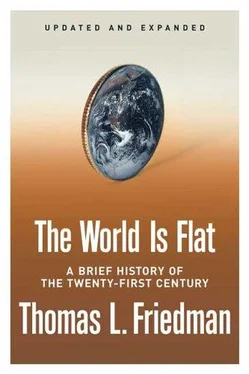A few days after returning from Mexico, I had breakfast in Washington with a friend from Egypt, Lamees El-Hadidy, a longtime business reporter in Cairo. Naturally I asked her where she was when she discovered the world was flat. She answered that it was a just few weeks earlier, during the Muslim holy month of Ramadan. She had done a story for CNBC Arabiya Television about the colorful lanterns called fawanis, each with a burning candle inside, that Egyptian schoolchildren traditionally carried around during Ramadan, a tradition dating back centuries to the Fatimid period in Egypt. Kids swing the lanterns and sing songs, and people give them candy or gifts, as in America on Halloween. For centuries, small, low-wage workshops in Cairo's older neighborhoods have manufactured these lanterns-until the last few years.
That was when plastic Chinese-made Ramadan lanterns, each with a battery-powered light instead of a candle, began flooding the market, crippling the traditional Egyptian workshops. Said Lamees, “They are invading our tradition -in an innovative way-and we are doing nothing about it... These lanterns come out of our tradition, our soul, but [the Chinese versions] are more creative and advanced than the Egyptian ones.” Lamees said that when she asked Egyptians, “Do you know where these are made?,” they would all answer no. Then they would turn the lamps over and see that they came from China.
Many mothers, like Lamees, though, appreciated the fact that the Chinese versions are safer than the traditional Egyptian ones, which are made with sharp metal edges and glass, and usually still use candles. The Chinese versions are made of plastic and feature flashing lights and have an embedded microchip that plays traditional Egyptian Ramadan tunes and even the theme song to the popular Ramadan TV cartoon series Bakkar. As Business Monthly, published by the American Chamber of Commerce in Egypt, reported in its December 2001 issue, Chinese importers “are pitted not only against each other, but also against the several-hundred-year-old Egyptian industry. But the Chinese models are destined to prevail, according to [a] famous importer, Taha Zayat. Imports have definitely cut down on sales of traditional fawanis,' he said. 'Of all fawanis on the market, I don't think that more than 5 percent are now made in Egypt.' People with ties to the Egyptian [fawanis] industry believe China has a clear advantage over Egypt. With its superior technology, they said, China can make mass quantities, which helps to keep prices relatively low. Egypt's traditional [fawanis] industry, by contrast, is characterized by a series of workshops specialized in different stages of the production process. Glassmakers, painters, welders and metal craftsmen all have their role to play. 'There will always be fawanis in Ramadan, but in the future I think Egyptian-made ones could become extinct/ Zayat said. 'There is no way they can ever compete with things made in China.'”
Think how crazy that statement is: Egypt has masses of low-wage workers, like China. It sits right next to Europe, on the Suez Canal. It could be and should be the Taiwan of the eastern Mediterranean, but instead it is throwing in the towel to atheistic China on the manufacture of one of Muslim Egypt's most cherished cultural artifacts. Ibrahim El Esway, one of the main importers from China of fawanis, gave The Business Monthly a tour of his warehouse in the Egyptian town of Muski: He had imported sixteen different models of Ramadan lanterns from China in 2004. “Amid the crowds at Muski, [El Esway] gestured to one of his employees, who promptly opened a dust-covered box and pulled out a plastic fawanis shaped like the head of Simba, from The Lion King. 'This is the first model we imported back in 1994,' he said. He switched it on. As the blue-colored lion's head lit up, the song 'It's a Small World' rang out.”
Introspection
The previous section of this book looked at how individuals, particularly Americans, should think about meeting the challenge posed by the flattening of the world. This chapter focuses on what sort of policies developing countries need to undertake in order to create the right environment for their companies and entrepreneurs to thrive in a flat world, although many of the things I am about to say apply to many developed countries as well.
When developing countries start thinking about the challenge of flatism, the first thing they need to do is engage in some brutally honest introspection. A country, its people and leaders alike, has to be honest with itself and look clearly at exactly where it stands in relation to other countries and in relation to the ten flatteners. It has to ask itself, “To what extent is my country advancing or being left behind by the flattening of the world, and to what extent is it adapting to and taking advantage of all the new platforms for collaboration and competition?” As that Chinese banking official boasted to my Mexican colleague, China is the wolf. Of all the ten flatteners, the entry of China into the world market is the most important for developing countries, and for many developed countries. China can do high-quality low-cost manufacturing better than any other country, and increasingly, it also can do high-quality higher-cost manufacturing. With China and the other nine flatteners coming on so strong, no country today can afford to be anything less than brutally honest with itself.
To that end, I believe that what the world needs today is a club that would be modeled after Alcoholics Anonymous (A.A.). It would be called Developing Countries Anonymous (D.C.A.). And just as at the first A.A. meeting you attend you have to stand up and say, “My name is Thomas Friedman and I'm an alcoholic,” so at Developing Countries Anonymous, countries would have to stand up at their first meeting and say, “My name is Syria and I'm underdeveloped.” Or “My name is Argentina and I'm underachieving. I have not lived up to my potential.”
Every country needs “the ability to make your own introspection,” since “no country develops without going through an X-ray of where you are and where your limits are,” said Luis de la Calle, one of Mexico's chief NAFTA negotiators. Countries that fall off the development wagon are a bit like drunks; to get back on they have to learn to see themselves as they really are. Development is a voluntary process. You need a positive decision to make the right steps, but it starts with introspection.
I Can Get It for You Wholesale
During the late 1970s, but particularly after the fall of the Berlin Wall, a lot of countries started to pursue development in a new way through a process that I call reform wholesale. The era of Globalization 2.0, when the world shrank from a size medium to a size small, was the era of reform wholesale, an era of broad macroeconomic reform. These wholesale reforms were initiated by a small handful of leaders in countries like China, Russia, Mexico, Brazil, and India. These small groups of reformers often relied on the leverage of authoritarian political systems to unleash the state-smothered market forces in their societies. They pushed their countries into more export-oriented, free-market strategies-based on privatization of state companies, deregulation of financial markets, currency adjustments, foreign direct investment, shrinking subsidies, lowering of protectionist tariff barriers, and introduction of more flexible labor laws-from the top down without ever really asking the people. Ernesto Zedillo, who served as president of Mexico from 1994 to 2000 and was finance minister before that, once remarked to me that all the decisions to open the Mexican economy were taken by three people. How many people do you suppose Deng Xiaoping consulted before he declared, “To get rich is glorious,” and opened the Chinese economy, or when he dismissed those who questioned China's move from communism to free markets by saying that what mattered was jobs and incomes, not ideology? Deng tossed over decades of Communist ideology with one sentence: “Black cat, white cat, all that matters is that it catches mice.” In 1991, when India's finance minister, Manmohan Singh, took the first tentative steps to open India's economy to more foreign trade, investment, and competition, it was a result not of some considered national debate and dialogue, but of the fact that India's economy at that moment was so sclerotic, so unappealing to foreign investors, that it had almost run out of foreign currency. When Mikhail Gorbachev started dabbling with perestroika, it was with his back up against the Kremlin wall and with few allies in the Soviet leadership. The same was true of Margaret Thatcher when she took on the striking coal miners' union in 1984 and forced reform wholesale onto the sagging British economy.
Читать дальше












